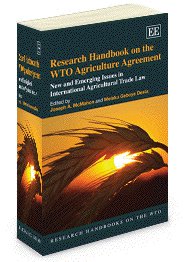15 Feb 2012
Books/ Book Chapters
Häberli, Christian
Do WTO Rules Improve or Impair the Right to Food?

Article by Christian Häberli in Joseph A. McMahon and Melaku G. Desta (eds.), Research Handbook On The Wto Agriculture Agreement: New and Emerging Issues in International Agricultural Trade Law, Edward Elgar, 2012, pp.50-72.
The global food crisis of 2007–08 seems to be forgotten. Media attention at the time focused on food riots in Haiti and Mozambique, while world leaders and more than a dozen international organizations gathered for several food summits, calling for immediate relief measures. But not a single government seems to remember its obligations under the Right to Food (R2F) which the United Nations (UN) had enshrined back in 1948. Today we have to acknowledge that the R2F still lacks an adequate response under the present multilateral rules and disciplines applying to food production and trade. This chapter examines the present rules and disciplines under the AoA and of those contemplated in the Doha Development Round. Here we find that despite claims to the contrary they contribute precious little to the R2F. Some of the present rules, or the lack thereof, can even act as disincentives for global and national food security. Various forms of production and export subsidies, food aid abuse and export restrictions, are still WTO-legal, with few remedies available to food insecure developing countries. This amounts to a violation of their R2F obligations by many WTO Members.
Do WTO Rules Improve or Impair the Right to Food?
Further info
Buy the book
Review of the book (video, 5 min)
Book brochure, PDF

